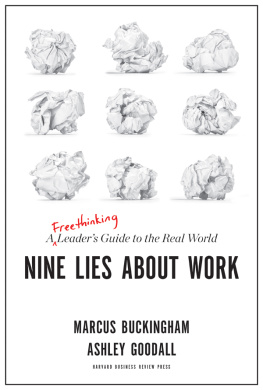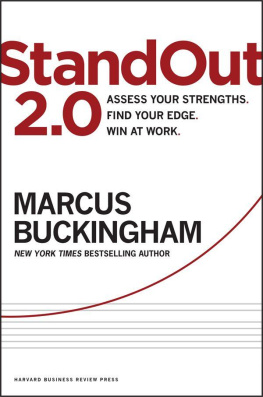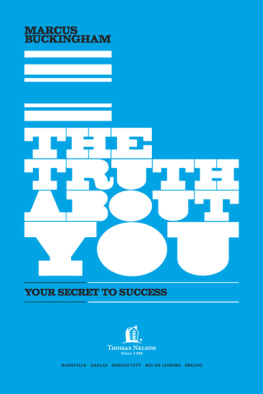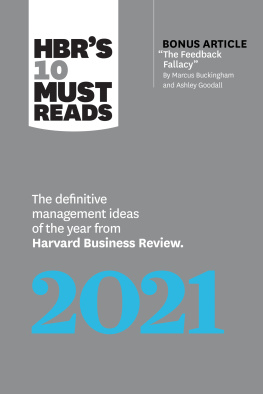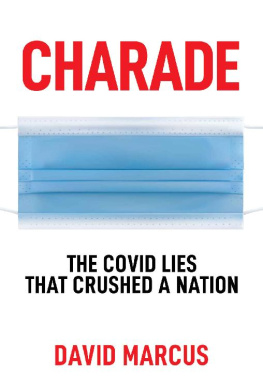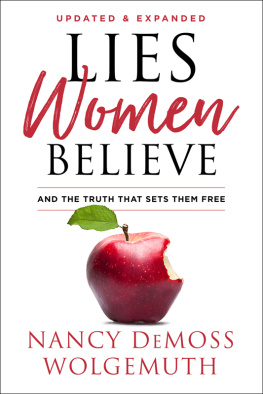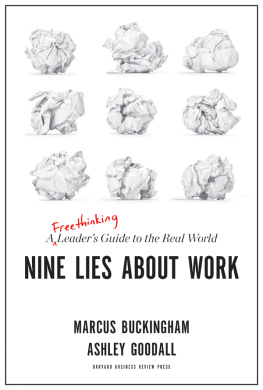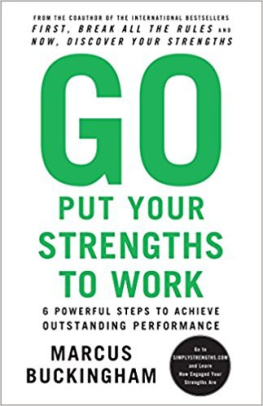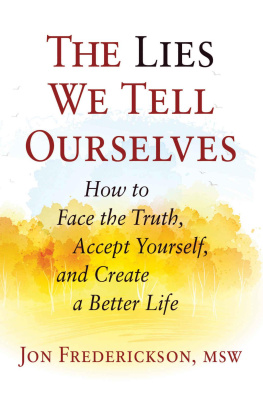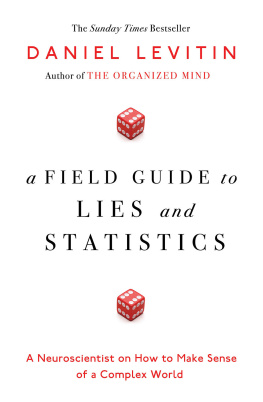HBR Press Quantity Sales Discounts
Harvard Business Review Press titles are available at significant quantity discounts when purchased in bulk for client gifts, sales promotions, and premiums. Special editions, including books with corporate logos, customized covers, and letters from the company or CEO printed in the front matter, as well as excerpts of existing books, can also be created in large quantities for special needs.
For details and discount information for both print and
ebook formats, contact ,
tel. 800-988-0886, or www.hbr.org/bulksales.
Copyright 2019 One Thing Productions, Inc. and Ashley Goodall
All rights reserved
Printed in the United States of America
10 9 8 7 6 5 4 3 2 1
No part of this publication may be reproduced, stored in or introduced into a retrieval system, or transmitted, in any form, or by any means (electronic, mechanical, photocopying, recording, or otherwise), without the prior permission of the publisher. Requests for permission should be directed to , or mailed to Permissions, Harvard Business School Publishing, 60 Harvard Way, Boston, Massachusetts 02163.
The web addresses referenced in this book were live and correct at the time of the books publication but may be subject to change.
Library of Congress Cataloging-in-Publication Data
Names: Buckingham, Marcus, author. | Goodall, Ashley (Author of Nine lies About work), author.
Title: Nine lies about work : a freethinking leaders guide to the real world / Marcus Buckingham, Ashley Goodall.
Description: Boston, Massachusetts : Harvard Business Review Press, 2019.
Identifiers: LCCN 2018046989 | ISBN 9781633696303 (hardcover)
Subjects: LCSH: Organizational effectiveness. | Industrial management. | Organizational change.
Classification: LCC HD58.9 .B84 2019 | DDC 650--dc23 LC record available at
https://lccn.loc.gov/2018046989
Hardcover ISBN: 978-1-63369-630-3
Paperback ISBN: 978-1-63369-803-1
eISBN: 978-1-63369-631-0
The paper used in this publication meets the requirements of the American National Standard for Permanence of Paper for Publications and Documents in Libraries and Archives Z39.48-1992.
To Chris and Graeme, who taught us to
start with whats knowable.
Contents
NINE LIES ABOUT WORK
Introduction
It aint what you dont know that gets you into trouble.
Its what you know for sure, that just aint so.
MARK TWAIN
Heres who we are.
Marcus is a data geek. He loves figuring out how to measure things you cant count, such as personality, performance, and engagement. He spent much of his career doing this at the Gallup Organization. He then built his own coaching and software company devoted to helping people do their best work, and he now leads the ADP Research Institutes investigations into all things people and performance. Hes a transplanted Brit.
Ashley lives in the world of big companies. After an early stint designing the acoustics for concert halls, he dedicated his career to helping the likes of Deloitte and Cisco get the most from all their people. Hes the kind of practitioner who loves to pressure test every innovative idea against the messy realities of the world of work. Currently hes doing this for Ciscos hundred and forty thousand employees and contractors around the world. Hes also a transplanted Brit.
A couple of years ago, the Harvard Business Review asked us to combine Marcuss reliable data angle with Ashleys real-world-leader angle and write an article about the most effective, reliable, and valid way to do that uniformly unpopular ritual, the performance appraisal. The article was bluntly damning of existing practices, and stirred up the field to such an extent that HBR came back to us and asked whether we could take this same rigorous and realistic approach and apply it to the entire world of work. We said yes, and the book youre holding is the result.
We began the book with a paradox: Why do so many of the ideas and practices that are held as settled truths at work wind up being so deeply frustrating to, and unpopular with, the very people they are supposed to serve? Why, for example, is it a settled truth that having your goals cascaded down upon you from above is the best way to align and evaluate your work, when those of us in the trenches feel the yearly goal-setting process to be meaningless rigmarole with little connection to our actual work? Why is it a settled truth that you need critical feedback, when, in the real world, most of us lean away from such feedback, and feel more inclined to give it to the other guy than to get it ourselves? Why is it a settled truth that your manager can reliably rate you on your performance, when, on actual teams, none of us has ever met a team leader blessed with perfect objectivity? Why is it a settled truth that all the best leaders possess a defined list of attributes that you should aspire to acquire, when, in our everyday lives, none of us has ever met a leader with all of these attributes?
This paradox led to the core idea and audience of the book. The idea is this: the world of work today is overflowing with systems, processes, tools, and assumptions that are deeply flawed and that push directly against our ability to express what is unique about each of us in the work we do In other words, whatever our current practices may be, they are no longer giving us much lift.
These practices are by now so commonplace and ingrained that they are hard to see for what they really are. Some of them we encounter as the necessary but frustrating things that large organizations just do and have always done. Some of them, though, are born of convictions held firmly by those who run our companies and who then impose these convictions on the rest of us. Together they form the backdrop and justification for almost everything that happens to us at workhow we are selected for jobs and how we are then evaluated, trained, paid, promoted, and fired.
And yet, look more closely and youll discover that they just aint so.
We could call these things misconceptions, or myths, or even misunderstandings, but because they are pushed at us so hard, almost as if theyre being used to steer us away from the world as it truly is, well call them lies.
There are nine of them in this book. And since, in Picassos framing, every act of creation is first an act of destruction, before we can build something strong and fine with our teams we need to deconstruct each lieto discern how it begins life as a truth in one small set of cases and then spreads into a lie applied to all casesand then push on to uncover the broader truths hidden behind.
The first three chapters, after asking why culture, plans, and goals are imposed on us so resolutely, reveal better ways for getting us all to questions why balance is held up to each of us as the ideal, and then presents a very different aspiration. And finally, the last chapter takes on our reverence for all things leadership, and offers up a new window into what really happens when we, as followers, give our breath and our passion to the vision of another.
As you read, youll realize that these Nine Lies have taken hold because each satisfies the organizations need for control. Large organizations are complex places, and a strong and understandable instinct of their leaders is to seek simplicity and ordernot least because this makes it easier to persuade themselves and their stakeholders that they are moving toward their objectives. But the desire for simplicity easily shades into a desire for conformity, and before long this conformity threatens to extinguish individuality. Before we know it, the particular talents and interests of each person are seen as inconveniences, and the organization comes to treat its people as essentially interchangeable.

